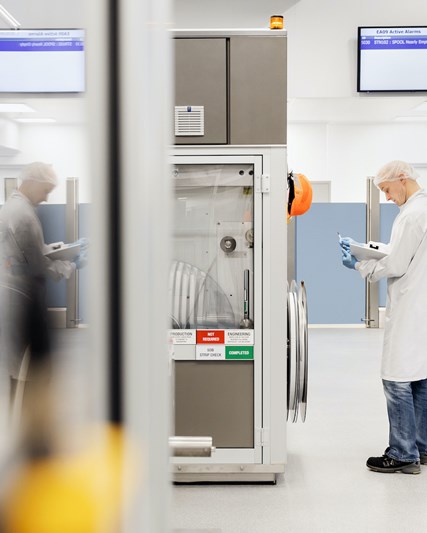GSK launches Sustainable Procurement Programme for suppliers
Issued: London, UK
For media and investors only
- From 2023, the company will require and support suppliers to take action on sustainability commitments and make improvements on emissions, energy, heat, transport, waste, water and biodiversity
- Announcement forms part of GSK’s work to achieve ambitious environmental goals to have a net zero impact on climate and a net positive impact on nature
GSK plc (LSE/NYSE: GSK) has today at Climate Week NYC launched a new Sustainable Procurement Programme to support the company’s suppliers on the journey towards having a net zero impact on climate and a net positive impact on nature.
Supply chains represent a significant proportion of the pharmaceutical industry’s environmental footprint, particularly the manufacturing of active pharmaceutical ingredients (APIs) which are resource intensive to produce in terms of heat, energy and water. For GSK, 40% of the company’s carbon footprint sits within its supply chain, and suppliers account for a substantial part of the company’s impact on water, waste and biodiversity globally.1,2,3,4 This means working with supply chains is pivotal to achieving GSK’s ambitious environmental goals on net zero carbon and restoring biodiversity.
GSK’s Sustainable Procurement Programme launched today will require and support suppliers to take action on carbon, power, heat, transport, water, waste, and sustainable, deforestation-free sourcing of materials. Specific areas of action will include: disclosing emissions, setting carbon reduction targets and delivery plans aligned to the 1.5 degree Science Based Targets initiative, switching to renewable power and heat, achieving water neutrality in water stressed areas, achieving 10% waste reduction, aligning to GSK’s responsible sourcing minimum standards, and transport suppliers providing green transport solutions.
Supplier action will in turn help GSK achieve its environmental goals on climate and nature, as well as helping both GSK and its suppliers create long-term value and build more business resilience.
As part of this new programme, GSK will actively support its suppliers with education and the adoption of new environmental sustainability measures. Next month, GSK will bring together over 160 suppliers which are crucial to delivering the company’s sustainability goals, to discuss how to work together towards these shared goals, and understand the support that these suppliers will need to do so.
Lisa Martin, Chief Procurement Officer at GSK, said: "Today's launch of the Sustainable Procurement Programme is a major step in bringing our supplier partners on the sustainability journey and GSK achieving our goals on climate and nature. As a global biopharma company committed to getting ahead of disease together, we must work closer than ever with our supply chain and beyond to catalyse positive change across environmental systems and protect the health of the planet and people."
Konrad Bauer, SVP Global Business Services at Thermo Fisher Scientific, said: “Our Mission is to enable our customers to make the world, healthier, cleaner and safer. As a long-term supplier and strategic partner to GSK, we are proud to partner in advancing our environmental impact, contributing to our collective net zero targets and protecting nature together.”
GSK action on supply chain sustainability
GSK is leading the development of several cross-industry collaboration projects to both identify the cause of climate and nature impacts in the supply chain, and to develop solutions at an industry scale.
The Energize programme, announced at COP26, aims to accelerate renewable energy adoption and enable bold climate action within the pharmaceutical value chain. This first-of-its-kind industry program will enable suppliers of pharmaceutical companies to learn more about renewable energy adoption and contracting. This gives suppliers – who may not otherwise have the internal resources or expertise available – the opportunity to participate in the market for power purchase agreements (PPAs).
GSK is partnering with Manufacture 2030 to address key challenges around the manufacturing of active pharmaceutical ingredients (APIs). APIs are resource intensive to produce and many suppliers are located in regions without easy access to green infrastructure or green financing. GSK and Manufacture 2030 are inviting wider collaboration from across the pharmaceutical sector to solve this shared challenge and are co-hosting an industry roundtable during Climate Week NYC to discuss next steps for this programme.
Lisa Martin, Chief Procurement Officer at GSK will discuss the Sustainable Procurement Programme at Climate Week NYC during a panel discussion: “Is anyone really leading on supply chain emissions reduction?” (Wednesday 21 September, 1330-1430 ET). This event can be accessed by registering online at the Climate Week website.
About Climate Week NYC
Climate Week NYC is the time and place where the world gathers to showcase amazing climate action and discuss how to do more. Run by the international non-profit Climate Group, in partnership with the United Nations and the City of New York, Climate Week NYC annually brings together voices from across the spectrum to debate and implement climate action. With over 500 events taking place as part of the official events program and hosting the most significant leaders from business and government, Climate Week NYC is one of the largest annual climate summits of its kind attracting global awareness and participation.
About GSK
GSK is a global biopharma company with a purpose to unite science, technology, and talent to get ahead of disease together. Find out more at gsk.com/company
Cautionary statement regarding forward-looking statements
GSK cautions investors that any forward-looking statements or projections made by GSK, including those made in this announcement, are subject to risks and uncertainties that may cause actual results to differ materially from those projected. Such factors include, but are not limited to, those described in the Company's Annual Report on Form 20-F for 2021, GSK’s Q2 Results for 2022 and any impacts of the COVID-19 pandemic.
References
[1] GSK. (2020). Understanding our value chain carbon footprint - GSK. Retrieved September 2022. Accessed from: https://www.gsk.com/media/9384/understanding-our-value-chain-carbon-footprint.pdf
[2] GSK. (2020). Understanding our value chain water footprint. Retrieved September 2022. Accessed from: https://www.gsk.com/media/9374/understanding-our-value-chain-water-footprint.pdf
[3] GSK. (2022). Biodiversity. Retrieved September 2022. Accessed from: https://www.gsk.com/en-gb/responsibility/environmental-sustainability/biodiversity/
[4] GSK. (2022). Materials and waste. Retrieved September 2022. Accessed from: https://www.gsk.com/en-gb/responsibility/environmental-sustainability/biodiversity/



